
Slovo
Scope & Guideline
Fostering Scholarly Dialogue on Slavic Heritage
Introduction
Aims and Scopes
- Cultural and Historical Analysis:
The journal emphasizes the examination of cultural artifacts and historical narratives, often centering on Eastern European and Slavic themes. This includes studies of literature, arts, and historical events that shape national and regional identities. - Interdisciplinary Approaches:
Slovo promotes interdisciplinary research methodologies, integrating perspectives from history, linguistics, cultural studies, and media studies. This allows for a nuanced understanding of the subjects explored in the journal. - Focus on Marginalized Voices:
The journal prioritizes the exploration of marginalized and underrepresented groups within Eastern European societies. This includes discussions on gender, ethnicity, and socio-political movements that challenge dominant narratives. - Media and Representation:
There is a consistent focus on how media shapes public perception and cultural narratives in Eastern Europe. This includes analyses of media portrayals and their implications for societal understanding and historical memory. - Contemporary Issues and Reflections:
Slovo addresses contemporary socio-political issues, including nationalism, migration, and identity crises in Eastern Europe, reflecting on the historical roots and current implications of these challenges.
Trending and Emerging
- Exploration of Identity Politics:
Recent publications have increasingly focused on identity politics, particularly in relation to gender, ethnicity, and national identity. This theme is crucial for understanding the complexities of societal divisions and the quest for representation in Eastern Europe. - Media Influence and Discourse Analysis:
There is a growing interest in analyzing media narratives and their influence on public opinion and cultural identity. This includes studies on how media shapes perceptions of crises, such as migration and political unrest. - Post-Colonial Perspectives:
Emerging themes include post-colonial analyses that examine the legacies of colonialism and their impact on contemporary Eastern European societies. This approach is essential for understanding the historical context of current socio-political issues. - Transnational Narratives and Connections:
The journal is increasingly publishing work that explores transnational connections and narratives, reflecting the interconnectedness of cultures and histories in a globalized world. - Historical Memory and Trauma Studies:
There is a notable trend towards examining historical memory and trauma, particularly in the context of war, repression, and marginalized experiences. This theme is significant for understanding how societies process and remember their pasts.
Declining or Waning
- Traditional Literary Criticism:
There seems to be a waning focus on traditional literary criticism, which may have been overshadowed by more contemporary and interdisciplinary approaches that engage with broader cultural and historical contexts. - Eurocentric Historical Narratives:
Research that strictly adheres to Eurocentric perspectives on Eastern European history is becoming less prevalent. There is a growing emphasis on alternative narratives that incorporate diverse voices and experiences. - Static Representations of Identity:
Themes surrounding fixed or static representations of national identity are declining. Scholars are increasingly interested in the fluidity of identity and its complexities, moving away from simplistic categorizations. - Overly Academic Discourse:
There appears to be a decreasing interest in highly theoretical or jargon-heavy academic discourse, with a shift towards more accessible and engaging writing that appeals to a broader audience. - Historical Events Without Contemporary Relevance:
Research focused solely on historical events that lack contemporary relevance is becoming less common, as there is a stronger push for studies that connect historical insights to current issues and discussions.
Similar Journals
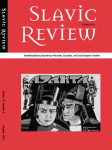
SLAVIC REVIEW
Exploring the Depths of Slavic Culture and History.SLAVIC REVIEW, published by Cambridge University Press, is a prominent academic journal that delves into the rich tapestry of Slavic studies, focusing on the cultural, historical, and social dimensions of Slavic regions. With an ISSN of 0037-6779 and an E-ISSN of 2325-7784, this journal holds a significant position within the academic community, ranking in the Q2 category of Arts and Humanities (miscellaneous) and achieving a Q1 rating in Cultural Studies as of 2023. Notably, the journal has consistent relevance in the field, as evidenced by its Scopus rankings—Rank #260 in Cultural Studies and Rank #204 in Miscellaneous Arts and Humanities. Since its converged years starting from 1966 up to the present, SLAVIC REVIEW has been an essential resource for researchers, professionals, and students aiming to deepen their understanding of Slavic cultures. While it operates on a traditional subscription model and does not provide open access, the journal remains a vital platform for pioneering research and critical discourse in Slavic studies.

Vestnik Sankt-Peterburgskogo Universiteta-Istoriya
Pioneering New Perspectives in the Study of HistoryVestnik Sankt-Peterburgskogo Universiteta-Istoriya is a distinguished academic journal published by the St Petersburg University Press, specializing in the field of History. As an influential platform since its inception in 2017, the journal has rapidly gained recognition, achieving a commendable Q2 ranking in History for 2023 and ranking #631 out of 1760 in Scopus's category of Arts and Humanities. With an emphasis on fostering scholarly discourse and disseminating high-quality research, it presents a curated selection of original research articles, critical reviews, and historical analyses, appealing to historians, researchers, and students alike. Operating from Russia, Vestnik Sankt-Peterburgskogo Universiteta-Istoriya serves not only as an incubator for innovative ideas but also as a bridge for international collaboration in the historiographical community. Although it currently does not offer open access, the journal's commitment to academic rigor and relevance ensures its continued impact in the field, with converged years extending to 2024, providing a rich archive for future scholars to engage with.
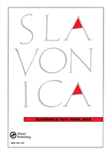
SLAVONICA
Bridging Historical Insights with Contemporary PerspectivesSLAVONICA is a distinguished academic journal dedicated to the exploration and analysis of Slavic studies, incorporating a wide array of cultural, historical, and linguistic perspectives. Published by Routledge Journals, Taylor & Francis Ltd, this journal serves as a critical platform for interdisciplinary scholarship, emphasizing the dynamic nature of Slavic cultures and languages. Though it currently does not offer Open Access, SLAVONICA is an important resource for researchers, professionals, and students seeking to engage with the latest academic discourse in the fields of Cultural Studies, History, Literature, and Linguistics, achieving a recognized place in the Q4 quartile across several categories as of 2023. With coverage spanning from 1994 to 2024, and its commitment to fostering academic inquiry, SLAVONICA plays a vital role in elevating the understanding of Slavic heritage and contemporary issues, making it essential reading for anyone interested in the complexities of this region.

Studia Slavica et Balcanica Petropolitana
Connecting Cultures: A Gateway to Slavic and Balkan ScholarshipStudia Slavica et Balcanica Petropolitana is an esteemed open-access journal, published by the Department of History at St. Petersburg State University, focusing on interdisciplinary research within the fields of Slavic and Balkan studies. Since its inception in 2007, the journal has made significant contributions to the academic discourse surrounding historical and contemporary issues pertinent to these regions, thus achieving a strong reputation among scholars. As of 2023, it is categorized in the Q2 quartile for History, ranked 873 out of 1760 in the arts and humanities segment, highlighting its impactful scholarly contributions. The journal operates out of Russia, with its editorial office located at Mendeleevskaya Liniya in St. Petersburg. Its accessible publishing model promotes widespread dissemination of knowledge, making it an invaluable resource for researchers, professionals, and students who aim to deepen their understanding of Slavic and Balkan societies from both historical and modern perspectives.
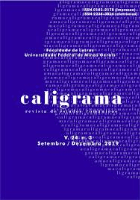
Caligrama-Revista de Estudos Romanicos
Exploring the Rich Tapestry of Romance StudiesCaligrama-Revista de Estudos Romanicos is a prestigious academic journal dedicated to the comprehensive exploration of Romance Studies, focusing on the interconnections between language, literature, and culture. Published by the Department of Philosophy & Human Sciences at the Federal University of Minas Gerais, Brazil, this journal has championed Open Access since its inception in 1981, ensuring that knowledge is universally accessible to researchers, professionals, and students alike. With its strategic location in Belo Horizonte, MG, Caligrama serves as a pivotal platform for the dissemination of high-quality scholarship in the field, encouraging rich discourse and interdisciplinary collaboration. The journal's commitment to scholarly excellence is reflected in its rigorous peer-review process, making it a vital resource for those seeking to delve into the complexities of Romance languages and cultures. Join a vibrant community of scholars by contributing to or accessing the thought-provoking articles within this dynamic journal, which continues to expand its impact on academia and beyond.

Transylvanian Review
Bridging Disciplines: Interdisciplinary Insights from TransylvaniaTransylvanian Review is an esteemed academic journal published by the CENTER TRANSYLVANIAN STUDIES, focusing on the fields of cultural studies and history. Since its inception in 2008, this journal has been committed to exploring the historical and cultural dynamics of Transylvania and the broader region, contributing to the scholarly discourse on Eastern European studies. Although currently classified in the Q4 quartile of both cultural studies and history in 2023, it serves as a valuable resource for researchers, professionals, and students aiming to deepen their understanding of cultural intersections and historical narratives. With its commitment to interdisciplinary approaches and rigorous scholarship, Transylvanian Review plays an essential role in fostering dialogue and insight within the academic community, and it aims to continue expanding its influence through accessible and impactful articles. Based in Cluj-Napoca, Romania, it enriches the academic landscape with a unique focus on regional studies.

Acta Baltico-Slavica
Advancing Interdisciplinary Dialogue in Baltic StudiesActa Baltico-Slavica, an esteemed academic journal published by the Polish Academy of Sciences, Institute of Slavic Studies, serves as a vital platform for the exploration of Slavic cultures, languages, and historical narratives. Since its transition to Open Access in 2014, the journal has fostered inclusivity and accessibility, allowing researchers, professionals, and students to engage with cutting-edge scholarship in the fields of History, Linguistics and Language, and Literature and Literary Theory. With a commendable impact as indicated by its category quartile rankings (Q2 in History and Literature, Q3 in Linguistics), and Scopus rankings reflecting its significance within the academic community, Acta Baltico-Slavica not only contributes to the rich tapestry of scholarship surrounding the Baltic and Slavic regions but also encourages interdisciplinary dialogue. The journal’s commitment to advancing knowledge across its fields of study makes it a prominent destination for scholarly discourse and research inquiry.
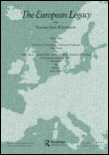
European Legacy-Toward New Paradigms
Fostering Innovative Perspectives on Europe's PastEuropean Legacy-Toward New Paradigms is a distinguished academic journal published by Routledge Journals, Taylor & Francis Ltd, focusing on interdisciplinary approaches to cultural studies, history, and philosophy. With an ISSN of 1084-8770 and an E-ISSN of 1470-1316, this journal has made significant contributions to the understanding of European heritage and its impact on contemporary thought and society since its inception in 2001. It currently holds a Q3 ranking in Cultural Studies, History, and Philosophy, reflecting its relevance and scholarly impact within the academic community. Although not an Open Access journal, European Legacy provides valuable insights and research findings through its carefully curated articles, making it an essential resource for researchers, professionals, and students alike. The journal's commitment to exploring new paradigms fosters critical dialogue and encourages innovative perspectives on Europe’s complex legacies, thereby positioning itself as a vital platform for ongoing academic discourse.
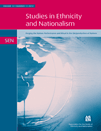
Studies in Ethnicity and Nationalism
Advancing Understanding of Ethnic and National IdentitiesStudies in Ethnicity and Nationalism, published by WILEY, is a prestigious academic journal that serves as a vital forum for the exploration and dialogue surrounding issues of ethnicity, nationalism, and identity in today’s globalized society. With an ISSN of 1473-8481 and E-ISSN 1754-9469, this journal not only addresses theoretical frameworks but also provides empirical research essential for understanding complex social dynamics. Holding a commendable Q3 ranking in the fields of Sociology and Political Science, and positioned at the 57th percentile among its peers, it boasts a significant impact on contemporary scholarly discourse since its inception in 2001. Although it does not currently offer an Open Access option, it remains dedicated to publishing high-quality, peer-reviewed research that contributes to policy-making, academic scholarship, and the broader public understanding of ethnicity and nationalism. Researchers, professionals, and students can benefit immensely from the insights provided in this journal, making it an essential resource for those engaged in the social sciences.

Camino Real-Estudios de las Hispanidades Norteamericanas
Advancing Interdisciplinary Dialogue on Hispanic InfluencesCamino Real-Estudios de las Hispanidades Norteamericanas is an esteemed journal published by the Universidad de Alcalá, Instituto Franklin de Investigación Norteamericanos, focusing on the interdisciplinary study of North American Hispanic studies. With a dedicated mission to advance scholarship in this emerging field, the journal serves as a crucial platform for researchers, academics, and students interested in exploring the cultural, historical, and social dynamics of Hispanic populations in North America. While the journal does not currently operate under an Open Access model, it is committed to rigorous peer review and upholding academic standards that are essential for quality research dissemination. Situated in Alcalá de Henares, Spain, this journal not only contributes to the understanding of Hispanic influences in North American contexts but also strengthens the dialogue between diverse scholarly communities, making it a valuable resource for anyone engaged in this vital area of study.